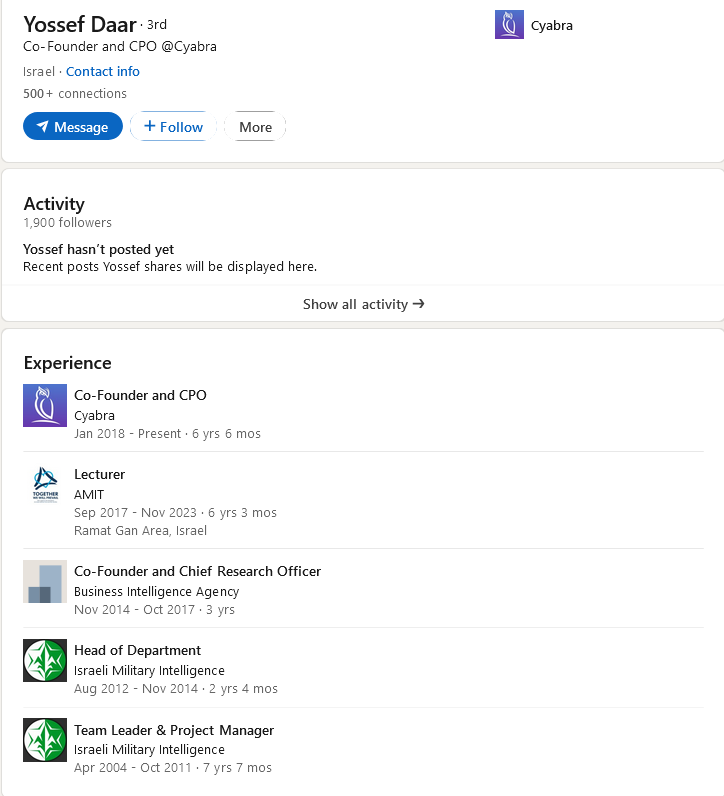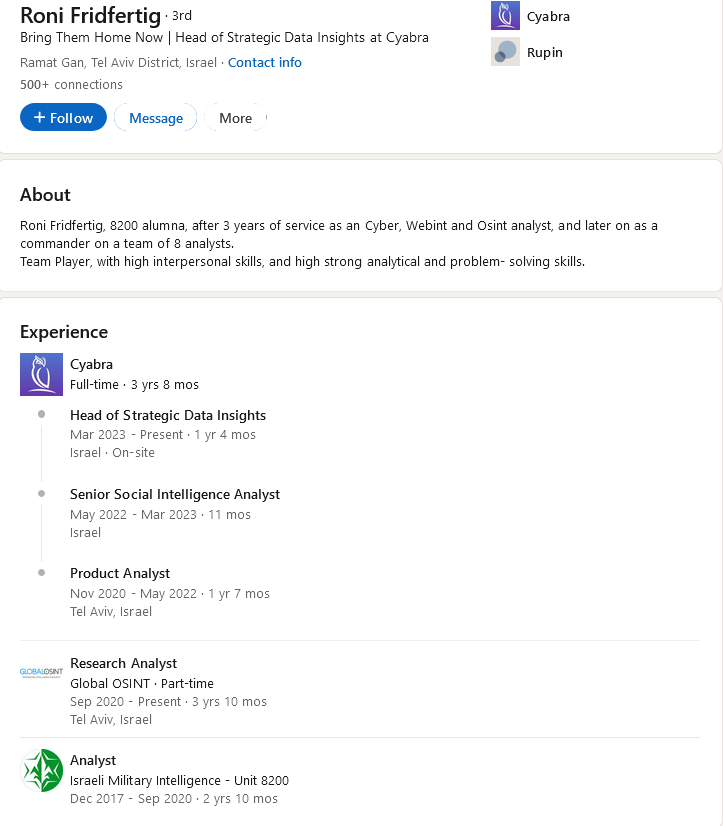
MintPress News’ Lowkey, one of the United Kingdom’s most prominent and outspoken opponents of the Israeli onslaught against Gaza, has been under attack. In May, The Daily Telegraph, one of Britain’s largest newspapers, published a report claiming that Russia, China and Iran were boosting the rapper’s messaging on social media “in an effort to stoke division” and manipulate public opinion across the country.
Central to the Telegraph’s claims is a report by tech firm Cyabra, which asserted that 11% of profiles engaging with him on Twitter were fake, implying that an organized bot network was artificially amplifying his messages.
Yet what the Telegraph failed to inform readers was that Cyabra was not just “a tech firm specializing in countering disinformation online,” as it claimed, but an Israeli company founded by military intelligence officers, half of whose employees have left to rejoin the Israeli Defense Forces (IDF) to fight in Gaza – and one that continues to openly work with Israeli military intelligence to this day.
Instead, the Telegraph allowed Israeli government officials to assert unchallenged that the United Kingdom was under “threat” from pro-Hamas organisations that are operating all across Britain with a clear purpose to impose Sharia law and to make Britain a Muslim island” and to advise that authorities must be “far more aggressive” against these “enemies” that threaten British values and the British way of life.
Unfortunately, Cyabra’s methodology was as shoddy as the Telegraph’s reporting. First, the study they published does not even mention Lowkey. Second, there is essentially zero evidence supplied in their reporting. Finally, there are no spreadsheets where readers can access the names of the supposedly fake accounts so that researchers can judge for themselves.
The study failed to show whether these bot networks truly amplified messages from Lowkey or other pro-Palestine influencers in any meaningful way. In fact, beyond pointing to some extremely generic profiles with barely any followers and leaving boilerplate replies such as “Amazing! This is fantastic! How cool! Congratulations!” they show little to no evidence of any interference—foreign or otherwise.
The clear implication is that 11% of profiles interacting with Lowkey being fake would be proof that the massive upsurge in pro-Palestine sentiment across the world is artificially manufactured from abroad. Yet what Cyabra leaves out of the report is the crucial context that a considerable proportion of social media accounts are fake and always have been.
Estimates of the true number of fake accounts on Twitter run from anywhere between 5% to more than 80%, and Twitter owner Elon Musk suggested that one in five personas on his platform were false. Cyabra itself claims that 11% are fake and that celebrities and other public figures draw more bot accounts than average.
Recent Cyabra studies have asserted that 13% of all Twitter accounts debating the upcoming U.S. presidential elections are bots, and 20% of those discussing disgraced human trafficker Jeffrey Epstein are inauthentic. Thus, Cyabra’s claim that 11% of profiles interacting with Lowkey are fake is hardly a smoking gun. In fact, it only reinforces that Lowkey and his views have widespread global support.
AN ISRAELI INTELLIGENCE ARM
“We are the watchdog for truth and trustworthiness on social media,” Cyabra CEO Dan Brahmy loftily claimed. The company possesses essentially no organic reach (at the time of writing, it had 221 subscribers on YouTube and 1,145 and 120 followers on Twitter and Instagram, respectively). Yet, it has risen to become an extremely influential organization. Its work, purporting to “uncover the good, bad and fake online,” has been referenced in outlets such as The New York Times, The Washington Post, CNN, Fox News, The Wall Street Journal and USA Today.
However, none of these write-ups in prominent outlets detail the company’s extremely close connections to the Israeli government. Brahmy, for instance, was an IDF shooting and combat instructor before he founded Cyabra.
Its two other co-founders were key members of Israeli intelligence. As Brahmy boasted in a recent interview:
“Luckily enough, I found the two people on the planet that have the audacity and the knowledge to be able to say that they were part of the commanders of information warfare within the Israeli Army. And after a really long military service, they felt that they had to do something about it [online information warfare].”
Brahmy is referring to Ido Shraga and Yossef Daar. Shraga was formerly a cyber systems engineer in the Israeli Defense Forces before co-founding the company. Daar is a longtime veteran of the controversial military group Unit 8200.

Unit 8200 is the centerpiece of Israel’s hi-tech surveillance apparatus and is the architect of the surveillance state imposed upon Palestinians. Unit 8200 has created a massive, worldwide digital dragnet to spy upon Palestinians, using their personal data as kompromat, blackmail and extortion. Its veterans are also behind the Pegasus software that was sold to the world’s worst human rights abusers to hack phones and surveil high-value targets.
From 2004 to 2014, Daar was a leader at Unit 8200, rising to become its head of department. The close connections to Israeli military intelligence do not stop there, however.
Cyabra likely actively recruits from Unit 8200 and other IDF groups. For example, Roni Fridfertig left her job as a Unit 8200 analyst to join Cyabra, where she is currently head of strategic insights. Working alongside Fridfertig is Lali Bar, a cyber intelligence analyst team leader at Unit 8200 until March, when she began working at Cyabra as a strategic data analyst.

Daniel Elya was an aerial photograph decoder and technical product manager for Unit 8200 between 2017 and 2020. In 2022, he became a product manager and head of operations for Cyabra. Customer success team leader Tanya Barkatz was, until 2021, a master sergeant intelligence analyst at the Lahav 433, Israel’s equivalent to the FBI. Until 2019, Cyabra’s head of private sector sales, David Bar-Aharon, was an IDF field intelligence officer.

These state intelligence connections are far from cherry-picking. Under Israeli law, revealing any affiliation to Unit 8200 is a criminal offense, meaning that the few who brazenly announced it on their public LinkedIn profiles are likely just the tip of the iceberg.
In a recent interview, Brahmy revealed that half of his 40 employees have been called up for active military service and are currently involved in the occupation of Gaza and the displacement of millions of people from their homes. The other half are fighting on the digital battlefield for Israel, local outlet Israel 21c noted. Brahmy revealed that this includes closely liaising with their former colleagues in active military intelligence.
“We pass on information to security organizations inside Israel and beyond because they can apply pressure, help identify and feed back intelligence.“
Earlier this year, Cyabra also briefed the Israeli parliament, teaching the Knesset Committee for Artificial Intelligence and Advanced Technologies about tactics Hamas uses online. In short, Cyabra’s deep connections to the Israeli state – particularly Unit 8200 – make it difficult to ascertain where one ends and the other begins.
FROM SURVEILLANCE TO SILICON VALLEY
Unit 8200 is Israel’s most elite and perhaps infamous unit. Described as Israel’s Harvard, the brightest young minds in the country compete to be accepted, knowing the sort of training they will receive will set them up for lucrative tech careers. Arab Israelis are effectively barred from joining; indeed, they are among the unit’s principal targets.
The Financial Times called Unit 8200 “Israel at its best and worst” – the centerpiece of both its booming high-tech industry and its repressive state apparatus. Unit 8200 veterans have gone on to produce many of the world’s most downloaded apps, including maps service Waze and communications platform Viber.
In 2014, 43 reservists (including several officers) sent a letter to Prime Minister Benjamin Netanyahu, informing him they would no longer serve in its ranks due to its zealous persecution of Palestinians. This consisted of using big data to compile dossiers on vast numbers of the indigenous domestic population, including their medical history, sex lives, and search histories, so that it could later be used for extortion.
If a particular individual needed to travel across checkpoints for crucial medical treatment, permission could be suspended until they agreed to spy on others.
Information, such as if a person was cheating on their spouse or was homosexual, is also used as bait for blackmail. One former Unit 8200 operative said that he was trained to memorize different Arabic words for “gay” so that he could listen out for them in monitored conversations. All Palestinians, the Unit 8200 veterans claim, were treated as enemies of the state. “There’s no distinction between Palestinians who are, and are not, involved in violence,” the letter read.
More worryingly for an international audience is Unit 8200’s influence within the global tech platforms we trust with our data. A 2022 MintPress investigation found that hundreds of former Unit 8200 agents are working in Silicon Valley, achieving positions of influence at companies such as Google, Microsoft, Amazon and Meta.
One example of this is Emi Palmor. Palmor sits on the oversight board for Meta (the parent company of Facebook, WhatsApp and Instagram). This group effectively serves as the platforms’ supreme court, deciding which content should be promoted and which should be suppressed.
Gavriel Goidel, meanwhile, is Google’s head of strategy and operations. However, until 2016, he was head of learning at Unit 8200, leading an intelligence team to surveil and counter the activities of what he called “hostile activists.” With people such as Palmor and Goidel holding such influential roles at social media giants, it is perhaps not surprising that content sympathetic to the Palestinian cause is so ruthlessly suppressed online.
“WE LIED, WE CHEATED, WE STOLE”
Cyabra certainly has ambitions to become a truly global company. Its opening of an office in New York City and the appointment of former Secretary of State and CIA Director Mike Pompeo to its board of directors are a measure of this goal. “We are thrilled to welcome Mike Pompeo,” Brahmy said.
Throughout his distinguished career, Secretary Pompeo has demonstrated a deep understanding of the impact on national security posed by disinformation campaigns. His insights and guidance will be invaluable as Cyabra continues to develop innovative solutions to establish a digital immune system.”
Throughout his career at the State Department and Central Intelligence Agency, Pompeo was the source of disinformation campaigns destabilizing other countries’ national security. “I was the CIA director. We lied, we cheated, we stole. We had entire training courses [on] it,” Pompeo once quipped. The CIA, of course, has been the source of countless fake news scandals, has promoted regime change around the world, and has set up a worldwide network of media outlets to push pro-U.S. narratives.
Appointing a former CIA director to the board of a company that claims to offer a service distinguishing fact from fiction should immediately undermine that group’s credibility. But in today’s world, fact-checking is often directly sponsored by the U.S. government. At least five fact-checking groups Facebook relies upon to filter and judge news about Ukraine, for instance, are bankrolled by Washington.
As Israel launched its assault on Gaza, Cyabra jumped to attention on the online battlefield, rushing out reports claiming that 25% of all accounts discussing the October 7 attack were fake and pushing pro-Hams narrative or claiming that Russia, China, Iran, Lebanon, Syria and Iraq were engaged in a massive online anti-Israel conspiracy to stoke visceral anger by sharing misleading or false content.
One example Cyabra itself chose to illustrate this was Russian state TV channel RT en Español reporting that Iranian President Ebrahim Raisi called the attack on the Al-Ahli Hospital in Gaza an Israeli “war crime.” This was supposedly false because Israeli and Western sources insisted that Palestinians likely blew up their own hospital.
Disinformation exists on all sides of the Gaza attack, and all states attempt to control narratives as best they can. As Cyabra CEO Brahmy stated: “Social media is often the destination for millions of people to follow the news and share their opinion. Consequently, it is also the venue of choice for malicious actors to manipulate the narrative.”
Yet his company’s research implies that criticism of Israel is false or invalid, and its effect is to divert attention away from Israel’s actions. Israel, of course, is also carrying out a colossal propaganda effort online. Researchers such as Professor Marc Owen Jones have uncovered armies of pro-Israel sock-puppet accounts spreading anti-UNRWA disinformation and trying to undermine solidarity between black Americans and Palestinians. Yet Cyabra appears far less interested in scrutinizing pro-Israel campaigns – perhaps because they are a crucial part of them.
Discovered hundreds of sock puppets promoting Israeli propaganda on X, Threads, FB & Insta. It also includes ‘fake’ websites. Recently, it has been spreading anti-UNRWA #disinformation, & trying to undermine solidarity between Palestinians & Black people. #Gaza
Analysis pic.twitter.com/5TRe3RCwrm
— Marc Owen Jones (@marcowenjones) February 2, 2024
PROPAGANDA WARS
Israel has carried out a sustained and coordinated propaganda campaign that rivals the complexity of its military attack. In the two weeks following October 7, the Ministry of Foreign Affairs spent more than $7 million on advertisements on YouTube alone. These ads were overwhelmingly targeted at Western nations, with France, Germany, the United Kingdom, Belgium and the United States as the top targets.
In just 14 days, one campaign on one platform from one Israeli government department reached one billion sets of eyes – numbers that make anything Cyabra has supposedly uncovered look insignificant by contrast.
Many of these YouTube ads blatantly broke the platform’s terms of service, displaying graphic images of dead bodies and featuring false messaging, such as “Hamas=ISIS.”
The Ministry of Foreign Affairs has also launched a covert campaign to harass and intimidate American students, establishing a “task force” to carry out psychological operations aimed at, in their own words, “inflicting economic and employment consequences” against pro-Palestine protestors. While Foreign Minister Eli Cohen heads the task force, it stresses that its actions “should not have the signature of the State of Israel on it.”
Israeli propaganda campaigns, however, go back much further. Wikipedia has long been a target of Israeli infiltration. A project overseen by Naftali Bennett (who would later go on to become prime minister) deployed thousands of young Israelis to police the online encyclopedia, removing troublesome facts and framing articles more favorably to Israel. Those who made the most edits would receive rewards, including free hot air balloon rides.
SILENCING PRO-PALESTINE VOICES
Palestinians – or those who are sympathetic to them – have historically had their voices suppressed online. However, since October 7, the digital throttling of pro-Palestine sentiment has been ramped up. Hundreds of prominent figures have claimed that social media platforms are artificially limiting their reach because of their position on Israel-Palestine.
Instagram suspended the accounts of Eye on Palestine and Motaz Azaiza, two critical sources for on-the-ground reporting in Gaza. The platform also inexplicably added the word “terrorist” into the bios of hundreds of people identifying as Palestinian. It claimed later that this was a bug. However, the platform’s close connections to Unit 8200 suggest that this may have been less a bizarre mistake and more of an outcome of the company’s general milieu regarding Palestinian liberation.
MintPress News itself is facing constant online suppression. There is not an employee (this author included) who has not had their social media accounts restricted, suspended or deleted – something which rarely, if ever, happens to pro-Israel news sources.
Lowkey is no exception. Last week, Instagram locked him out of his account. Pro-Israel groups have successfully shut down his public events and have even attempted to have his music removed from the streaming service Spotify. Lowkey has, for many years, been a top target of the Israel lobby.
A hip-hop artist widely recognized as one of the most gifted lyricists of his generation, he has used his talents to highlight the suffering of Palestinians, gaining him a worldwide fan base. Tracks such as “Long Live Palestine” have become anthems of resistance the world over and are frequently played at solidarity demonstrations. As far back as 2011, The Jewish Chronicle wrote that his mere existence was a “potential nightmare” for Israel.
Cyabra purports to be a tech company helping individuals and organizations distinguish between fact and fiction online by promoting media literacy. Brahmy warns that every time you are online, “you can potentially become a target to a bad or fake actor that is trying to manipulate public opinion, that is trying to draw you into a contextualized trap.”
Yet a deep dive into Cyabra’s history, its key figures, and its activities suggest that it is itself a bad actor attempting to manipulate public opinion for the benefit of the Israeli state. Real critical media literacy would start by highlighting state-connected fact-checking groups and teaching individuals to be highly skeptical of any big-money company that offers to do the thinking for them – especially those with former Israeli intelligence leaders and CIA directors on their board.
Filed under: "Israel", Britain, Global Disinformation, Israeli Crimes crimes against humanity, Palestine, Palestinian people, Propaganda War | Tagged: Israeli Occupation Force IOF, Besieged Gaza Strip., CNN, New York Times, FoxNews, Anglozionist Genocidal War on Gaza, Israeli hasbara, Unit 8200 |




Leave a comment